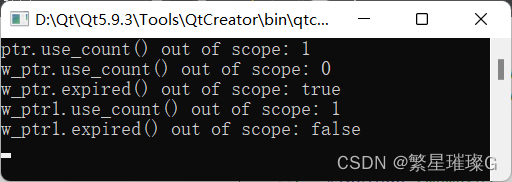-
c++ 智能指针 (std::weak_ptr)(一)
定义于头文件
template< class T > class weak_ptr; (C++11 起)std::weak_ptr是一种智能指针,它对被 std::shared_ptr 管理的对象存在非拥有性(「弱」)引用。在访问所引用的对象前必须先转换为 std::shared_ptr。std::weak_ptr用来表达临时所有权的概念:当某个对象只有存在时才需要被访问,而且随时可能被他人删除时,可以使用std::weak_ptr来跟踪该对象。需要获得临时所有权时,则将其转换为 std::shared_ptr,此时如果原来的 std::shared_ptr 被销毁,则该对象的生命期将被延长至这个临时的 std::shared_ptr 同样被销毁为止。std::weak_ptr 的另一用法是打断 std::shared_ptr 所管理的对象组成的环状引用。若这种环被孤立(例如无指向环中的外部共享指针),则
shared_ptr引用计数无法抵达零,而内存被泄露。能令环中的指针之一为弱指针以避免此情况。构造函数
std::weak_ptr<T>::weak_ptrconstexpr weak_ptr() noexcept;
(1) (C++11 起) weak_ptr( const weak_ptr& r ) noexcept;
(2) (C++11 起) template< class Y >
weak_ptr( const weak_ptr& r ) noexcept; (2) (C++11 起) template< class Y >
weak_ptr( const std::shared_ptr& r ) noexcept; (2) (C++11 起) weak_ptr( weak_ptr&& r ) noexcept;
(3) (C++14 起) template< class Y >
weak_ptr( weak_ptr&& r ) noexcept; (3) (C++14 起) 构造新的
weak_ptr,潜在地与r共享对象的。1) 默认构造函数。构造空
weak_ptr。2) 构造新的
weak_ptr,它共享r所管理的对象。若r不管理对象,则 *this 亦不管理对象。模板重载不参与重载决议,除非Y*可隐式转换为T*,或Y是某类型U和某数N的“N个U的数组”类型,而T是“(可有 cv 限定的)U的未知边界数组”类型 (C++17 起)。3) 移动构造函数。从
r移动 weak_ptr 实例到*this。之后,r为空且 r.use_count()==0 。模板重载不参与重载决议,除非Y*可隐式转换为T*。参数
r - 将为此 std::weak_ptr 所查看的 std::shared_ptr 或 std::weak_ptr 注意
因为默认构造函数是
constexpr,静态weak_ptr会在任何动态非局部初始化之前,作为静态非局部初始化的一部分初始化。这使得在任何静态对象的构造函数中使用weak_ptr是安全的。调用示例
- #include <memory>
- #include <iostream>
- struct Foo {};
- int main()
- {
- std::weak_ptr<Foo> w_ptr;
- {
- auto ptr = std::make_shared<Foo>();
- w_ptr = ptr;
- std::cout << "w_ptr.use_count() inside scope: " << w_ptr.use_count() << '\n';
- std::weak_ptr<Foo> w_ptr1(w_ptr);
- std::cout << "w_ptr1.use_count() inside scope: " << w_ptr.use_count() << '\n';
- }
- std::cout << "w_ptr.use_count() out of scope: " << w_ptr.use_count() << '\n';
- std::cout << "w_ptr.expired() out of scope: " << std::boolalpha << w_ptr.expired() << '\n';
- }
输出

析构函数
std::weak_ptr<T>::~weak_ptr~weak_ptr(); (C++11 起)销毁
weak_ptr对象。对被管理对象不产生影响。释放被管理对象的所有权
std::weak_ptr<T>::resetvoid reset() noexcept; (C++11 起)释放被管理对象的所有权。调用后 *this 不管理对象。
参数
(无)
返回值
(无)
调用示例
- #include <memory>
- #include <iostream>
- struct Foo {};
- int main()
- {
- std::shared_ptr<Foo> ptr = std::make_shared<Foo>();
- std::weak_ptr<Foo> w_ptr = ptr;
- std::weak_ptr<Foo> w_ptr1 = w_ptr;
- w_ptr.reset();
- std::cout << "ptr.use_count() out of scope: " << ptr.use_count() << '\n';
- std::cout << "w_ptr.use_count() out of scope: " << w_ptr.use_count() << '\n';
- std::cout << "w_ptr.expired() out of scope: " << std::boolalpha << w_ptr.expired() << '\n';
- std::cout << "w_ptr1.use_count() out of scope: " << w_ptr1.use_count() << '\n';
- std::cout << "w_ptr1.expired() out of scope: " << std::boolalpha << w_ptr1.expired() << '\n';
- }
输出

交换被管理对象std::weak_ptr<T>::swapvoid swap( weak_ptr& r ) noexcept; (C++11 起)交换 *this 与
r的内容参数
r - 要与之交换内容的智能指针 返回值
(无)
调用示例
- #include <memory>
- #include <iostream>
- struct Foo
- {
- int N;
- Foo(int n): N(n) {}
- };
- int main()
- {
- std::shared_ptr<Foo> ptr_1 = std::make_shared<Foo>(1);
- std::shared_ptr<Foo> ptr_2 = std::make_shared<Foo>(2);
- std::weak_ptr<Foo> w_ptr1 = ptr_1;
- std::weak_ptr<Foo> w_ptr2 = ptr_2;
- {
- std::shared_ptr<Foo> ptr1 = w_ptr1.lock() ;
- std::shared_ptr<Foo> ptr2 = w_ptr2.lock() ;
- std::cout << "ptr1 N: " << ptr1->N << '\n';
- std::cout << "ptr2 N: " << ptr2->N << '\n';
- }
- {
- w_ptr1.swap(w_ptr2);
- std::shared_ptr<Foo> ptr1 = w_ptr1.lock() ;
- std::shared_ptr<Foo> ptr2 = w_ptr2.lock() ;
- // 只交换std::weak_ptr
- std::cout << "ptr1 N: " << ptr1->N << '\n';
- std::cout << "ptr2 N: " << ptr2->N << '\n';
- // 不交换std::shared_ptr
- std::cout << "ptr_1 N: " << ptr_1->N << '\n';
- std::cout << "ptr_1 N: " << ptr_2->N << '\n';
- }
- }
输出

-
相关阅读:
反射技巧让你的性能提升 N 倍
go cpu、内存监控、性能分析:PProf
除法求值00
傻白入门芯片设计,wafer/die/chip/cell(一)
动静态库生成&&使用
策略验证_买入口诀_身抱多线好景出现
发布npm包质量分测试
jenkins安装和配置(三):制作镜像并上传及发布
springboot整合sentinel完成限流
jemalloc 库的编译(Linux 下面)
- 原文地址:https://blog.csdn.net/qq_40788199/article/details/126794230
